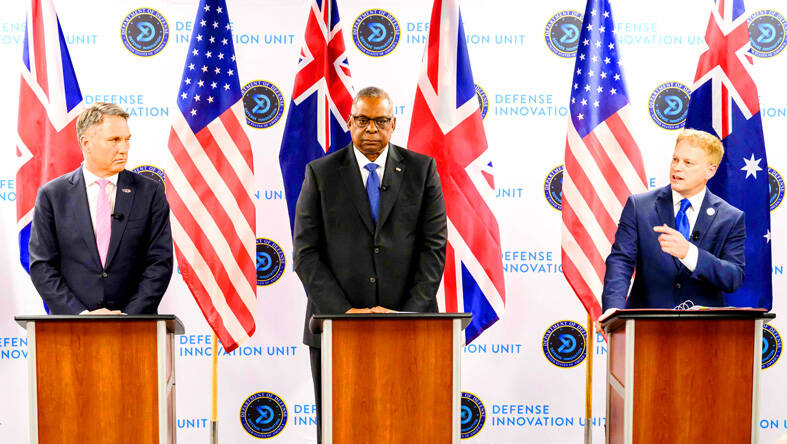From underwater drones to electronic warfare, the US is expanding its high-tech military cooperation with Australia and the UK as part of a broader effort to counter China’s rapidly growing influence in the Indo-Pacific region.
US Secretary of Defense Lloyd Austin on Friday met with Australian Minister for Defence Richard Marles and British Secretary of Defence Grant Shapps at the US military’s Defense Innovation Unit headquarters in Silicon Valley to forge a new agreement to increase technology cooperation and information sharing.
The goal is to be able to better address global security challenges, ensure each can defend against rapidly evolving threats and to “contribute to stability and prosperity in the Indo-Pacific region and beyond,” they said in a joint statement.

Photo: AFP
Speaking at a news conference after the meeting, Austin said the effort would rapidly accelerate the sophistication of the drone systems used by the members of the AUKUS military alliance among Australia, the UK and the US, and prove that “we are stronger together.”
The new technology agreement is the next step in the widening military cooperation with Australia that was first announced in 2021. The three nations have laid out plans to help equip Australia with a fleet of eight nuclear-powered submarines.
Under the deal, Australia is to buy three Virginia-class submarines from the US and build five of a new AUKUS-class submarine in cooperation with the UK. The subs, powered by US nuclear technology, would not carry nuclear weapons and would be built in Adelaide, Australia, with the first one to be finished in about 2040.
Marles said there has been an enormous amount of progress in the submarine program, adding that as an island nation, Australia has a need for improved maritime drones and precision strike capabilities.
Shapps said that with China “undermining the freedom of navigation in the Indo-Pacific, we’ve never had a greater need for more innovation.”
He said that open navigation of the seas, including in the Pacific and the South China Sea, is critical.
Royal Australian Navy officers have already started to undergo nuclear power training at US military schools, officials have said.
The new agreement also sets up a series of military exercises involving the use of undersea and surface maritime drones and improves the ability of the three countries to share intelligence and data collected by their sonobuoys, which are used to detect submarines and other objects in the water.
It also calls for plans to expand the use of artificial intelligence, including on P-8A surveillance aircraft, to more quickly process data from the buoys to improve anti-submarine warfare.
The three countries are also to establish new radar sites to beef up their ability to detect and track objects in deep space.

The CIA has a message for Chinese government officials worried about their place in Chinese President Xi Jinping’s (習近平) government: Come work with us. The agency released two Mandarin-language videos on social media on Thursday inviting disgruntled officials to contact the CIA. The recruitment videos posted on YouTube and X racked up more than 5 million views combined in their first day. The outreach comes as CIA Director John Ratcliffe has vowed to boost the agency’s use of intelligence from human sources and its focus on China, which has recently targeted US officials with its own espionage operations. The videos are “aimed at

STEADFAST FRIEND: The bills encourage increased Taiwan-US engagement and address China’s distortion of UN Resolution 2758 to isolate Taiwan internationally The Presidential Office yesterday thanked the US House of Representatives for unanimously passing two Taiwan-related bills highlighting its solid support for Taiwan’s democracy and global participation, and for deepening bilateral relations. One of the bills, the Taiwan Assurance Implementation Act, requires the US Department of State to periodically review its guidelines for engagement with Taiwan, and report to the US Congress on the guidelines and plans to lift self-imposed limitations on US-Taiwan engagement. The other bill is the Taiwan International Solidarity Act, which clarifies that UN Resolution 2758 does not address the issue of the representation of Taiwan or its people in

US Indo-Pacific Commander Admiral Samuel Paparo on Friday expressed concern over the rate at which China is diversifying its military exercises, the Financial Times (FT) reported on Saturday. “The rates of change on the depth and breadth of their exercises is the one non-linear effect that I’ve seen in the last year that wakes me up at night or keeps me up at night,” Paparo was quoted by FT as saying while attending the annual Sedona Forum at the McCain Institute in Arizona. Paparo also expressed concern over the speed with which China was expanding its military. While the US

SHIFT: Taiwan’s better-than-expected first-quarter GDP and signs of weakness in the US have driven global capital back to emerging markets, the central bank head said The central bank yesterday blamed market speculation for the steep rise in the local currency, and urged exporters and financial institutions to stay calm and stop panic sell-offs to avoid hurting their own profitability. The nation’s top monetary policymaker said that it would step in, if necessary, to maintain order and stability in the foreign exchange market. The remarks came as the NT dollar yesterday closed up NT$0.919 to NT$30.145 against the US dollar in Taipei trading, after rising as high as NT$29.59 in intraday trading. The local currency has surged 5.85 percent against the greenback over the past two sessions, central